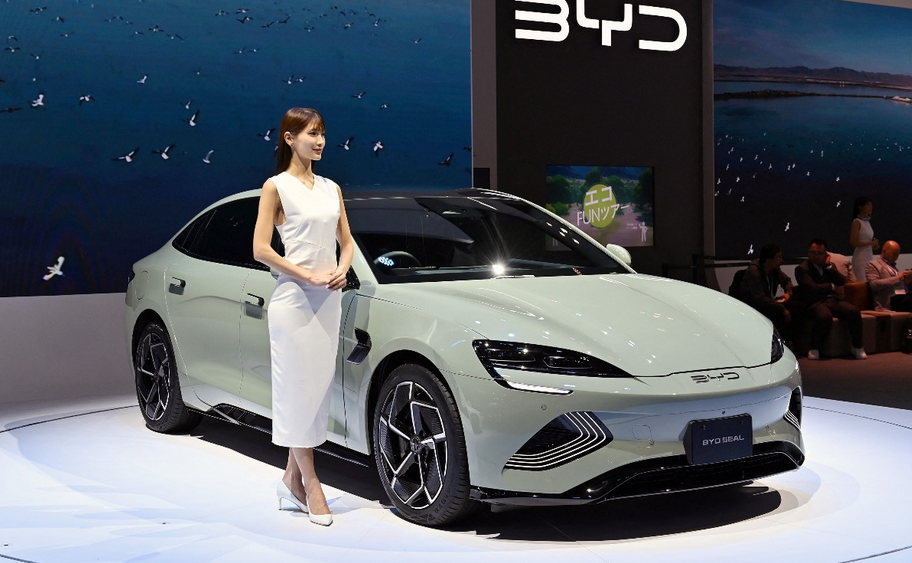China’s leading electric vehicle manufacturer, BYD, has achieved a remarkable milestone by surpassing Tesla in quarterly revenue for the first time. In Q3 2025, BYD reported 201.1 billion yuan (US$37.4 billion) in revenue, compared to Tesla’s US$25.2 billion, signaling a major shift in the global EV market. This achievement highlights BYD’s strategic focus on hybrid vehicles, vertical integration, and strong domestic demand.
Record Sales Drive BYD’s Revenue Growth
BYD’s strong Q3 performance was supported by record vehicle sales. The company sold 1.12 million electric and plug-in hybrid vehicles, marking a 24% year-over-year increase in revenue. Net profit rose to 11.6 billion yuan (around US$1.6 billion), an 11.5% increase from the previous year. While slightly below analyst expectations, these results underscore BYD’s growing dominance in China’s EV sector.
Meanwhile, Tesla continues to maintain a net profit of US$2.2 billion, but BYD’s hybrid-focused strategy has helped it capture an advantage in a highly competitive market.
The Power of Hybrids: Shielding BYD from Slowing Pure EV Demand
A key factor behind BYD’s success is its focus on hybrid vehicles. Unlike Tesla, which exclusively produces fully electric cars, BYD offers a variety of plug-in hybrids with advanced powertrains capable of ranges exceeding 2,000 km. These vehicles appeal to customers seeking flexibility, combining the benefits of electric driving with the convenience of extended range for longer trips.
This hybrid strategy has allowed BYD to avoid the slowdown affecting pure electric vehicle demand globally. By offering both hybrid and fully electric options, BYD can cater to a wider audience and maintain strong revenue growth.
Vertical Integration: A Strategic Advantage
BYD’s vertically integrated supply chain is another major factor contributing to its success. By producing a significant portion of its vehicle components in-house—including batteries, electric motors, and electronic systems—BYD gains:
-
Lower production costs, enabling competitive pricing
-
Faster scaling, to meet increasing demand
-
Enhanced quality control, ensuring reliable and consistent vehicles
This integration contrasts with Tesla’s reliance on external suppliers, which can create vulnerabilities in the supply chain. BYD’s ability to control core manufacturing processes provides both a cost and operational advantage, strengthening its market position.
BYD’s Position in the Global Automotive Industry
Thanks to its revenue growth and strategic initiatives, BYD has become the third-largest automaker by market value, trailing only Toyota and surpassing Volkswagen and Mercedes-Benz. Tesla remains the world’s most valuable carmaker, but BYD’s growth reflects the changing dynamics of the EV industry, where hybrid technology and domestic market strength can rival global brand recognition.
Government Support and Strong Local Demand
BYD’s success is also fueled by robust domestic demand and government incentives in China. National and local policies have encouraged the shift from gas-powered cars to electric and hybrid vehicles. These incentives include:
-
Purchase subsidies for EVs and hybrids
-
Reduced registration fees and taxes for clean-energy vehicles
-
Investment in charging infrastructure to support adoption
These measures have created a favorable environment for BYD, allowing it to dominate the domestic EV market while protecting it from external competition and tariffs.
Navigating Global Challenges
BYD continues to thrive despite challenges such as the recent 45% EU tariff on Chinese-made EVs. Its strong internal production capabilities and solid domestic demand allow the company to remain resilient against international trade barriers.
The company has also maintained ambitious growth targets, aiming to sell four million vehicles by the end of 2024. This positions BYD for a strong finish to the year and reinforces its role as a leader in hybrid and electric vehicle technology.
Tesla’s Challenges and Market Position
While Tesla remains a dominant global EV manufacturer, it faces several obstacles that could limit growth:
-
A narrow EV-only product lineup
-
Increasing competition from hybrid-focused manufacturers like BYD
-
Focus on Cybertruck production and partial automation over vehicle diversification
BYD’s hybrid advantage, vertical integration, and robust domestic market position give it a competitive edge in the evolving EV industry.
What BYD’s Milestone Means for the EV Industry
BYD surpassing Tesla in quarterly revenue represents a significant shift in the automotive landscape:
-
Hybrid vehicles remain crucial: Offering both electric and hybrid models appeals to a wider range of consumers.
-
Vertical integration drives efficiency: Producing key components in-house lowers costs and improves scalability.
-
Government incentives shape markets: Policy support accelerates EV adoption and strengthens domestic leaders.
-
Global competition intensifies: Tesla, BYD, and other manufacturers are redefining the automotive hierarchy.
Looking Ahead: BYD’s Growth Trajectory
As BYD continues toward its year-end sales target, the company’s focus on hybrids, local demand, and in-house manufacturing positions it for further growth. Analysts predict that BYD’s combination of operational efficiency, innovative technology, and strategic market positioning will allow it to challenge Tesla and other global competitors in the coming years.
The success of BYD demonstrates the importance of adaptability, diversified product offerings, and long-term planning in the rapidly expanding EV market.
Conclusion
BYD’s Q3 2025 revenue of US$37.4 billion, surpassing Tesla’s US$25.2 billion, marks a major milestone in the global EV market. The company’s hybrid-focused approach, vertical integration, and strong domestic demand have created a resilient business model capable of thriving amid global competition.
While Tesla remains a market leader, BYD’s innovative strategies highlight the importance of product diversification, efficient production, and supportive government policies in shaping the future of the EV industry.
As both companies continue to expand and innovate, the global EV landscape is set to reflect the strategies that allow manufacturers to scale efficiently, adapt to consumer needs, and capture market share in an increasingly competitive environment.




